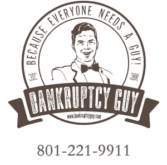Utah Medical Bankruptcy
Overview
In the world of bankruptcy, a bankruptcy, occurring due to medical problems is sometimes termed a “Medical Bankruptcy”. Health care is known to be one of the top reasons for bankruptcy in the United States. Several recent study’s have shown a link between medical debts and bankruptcy.
Some creditors take the view that bankruptcy is bankruptcy, and whether you are filing due to a divorce, credit card debt, foreclosure, or medical expenses, it is all the same. The bankruptcy code does not distinguish between debtors driven into bankruptcy by medical bills and those who become insolvent due to other reasons. However, many mortgage lenders take into consideration what they term a “medical bankruptcy” due to the majority of ones debts being incurred due to medical issues. There is currently legislation pending in congress to help those who face bankruptcy due to medical debts and to create a class of bankruptcy called Medical Bankruptcy.
Medical debts are unsecured debts, so there’s no collateral available, which the creditors can repossess. However, the medical debt can be tied to collateral, and the insurance company may be able to garnish your wages, or claim a part of equity in a home, in case a bankruptcy filing protection is not availed.
Medical Bankruptcy
Medical bankruptcy refers to a situation where an individual or family is forced to file for bankruptcy due to the high cost of medical expenses. Despite the availability of health insurance, many people still find themselves facing financial hardship as a result of medical bills. Here are the most common reasons for excessive medial debts:
1. High Cost of Health Care: One of the main reasons for medical bankruptcy is the high cost of health care in the United States. The cost of medical procedures, treatments, and medications continues to rise, making it difficult for many individuals and families to afford the care they need.
2. Lack of Coverage: Despite the availability of health insurance, many people still lack adequate coverage for medical expenses. Insurance policies may have high deductibles, co-pays, or out-of-pocket maximums, which can make it difficult for individuals to afford the care they need.
3. Unexpected Medical Expenses: Medical bankruptcy can also result from unexpected medical expenses, such as those associated with accidents, illnesses, or medical emergencies. These unexpected expenses can quickly accumulate and result in significant financial hardship.
4. Lost Wages: In some cases, individuals may be forced to take time off work to care for themselves or a loved one. This can result in lost wages and added financial stress.
4. Strain on Personal Relationships: Medical bankruptcy can also result in significant emotional and financial stress, which can strain personal relationships and lead to feelings of shame, guilt, and hopelessness.
Medical bankruptcy is a growing problem in the United States, and one that affects individuals and families from all walks of life. While the Affordable Care Act has helped to increase access to health insurance, many people still face significant financial hardship as a result of medical expenses.
The Law Office of Douglas Barrett has helped thousands of clients navigate a medical bankruptcy. We can help you navigate the world of medical bankruptcy as well.


